
Moderna’s personalised mRNA cancer vaccine shows promise for next phase of trials
- Data from Moderna, Merck skin cancer Phase 2 trials shows ‘extremely strong result’
- Company says Hong Kong could play a role in future mRNA vaccine development
Moderna said the vaccine reduced the risk of recurrence or death of melanoma by 44 per cent when paired with Merck’s skin cancer medicine, compared with using the drug alone, according to Phase 2 trial results.
Burton said the companies would expand future trials of the cancer vaccine to the world and to other types of cancer.
“We’re absolutely prepared and really want to double down. We’ll share the data with regulators in the US and then around the world and discuss it with them,” he said.
Burton said the company planned to publish the full trial data of the 157 patients with stage three or four melanoma in a scientific journal as soon as possible.

Moderna is one of the biotechnology companies pioneering mRNA technology to produce vaccines and medicine. Moderna’s mRNA jab was among the earliest approved vaccines against Covid-19, in addition to ones manufactured by Pfizer and BioNTech.
Unlike traditional vaccines that introduce a weakened or inactivated virus into the body, mRNA, or messenger RNA, uses a molecule that teaches human cells how to make a protein, which triggers an immune response in the body by producing antibodies.
Burton was also asked about the prospect of the Moderna mRNA Covid-19 vaccine being used in China.
Burton said as the Covid-19 pandemic eased, the drug makers were able to accelerate the cancer vaccine trials and complete them.
“We learned so much about manufacturing, supply and shipment. That’s been a great thing that we will be able to put into the cancer work.”
He said the drug makers planned to expand the tests to other cancer types, such as lung and colorectal cancer, as well as to those that are harder to treat and less responsive to medicines, like cancers that occur in the brain or spinal cord (glioblastoma), and cancers that begin in the bones and soft tissues (sarcoma).
“We would be very interested in doing work in mainland China. We would need to talk to the regulators there, the State Food and Drug Administration, and see how that could work.”
He said the vaccines for the study were produced in the United States. But once the vaccine was rolled out globally, production hubs around the world, including in Asia, would be needed.
“Long term, we would see regional hubs in different zones of the world so that tissue can be taken from patients and quickly shipped to a facility where the process can begin.”
The cancer vaccines are tailored for each patient so that a patient can generate an anti-tumour response specific to the mutational signature of a tumour, according to the companies.
“We take a biopsy of the cancer from a patient and some of their normal cells. Then we sequence the cancer tissue for mutations and proteins that likely drive the development of the cancer. We use an algorithm to identify the key mutations,” Burton said.
“The power of mRNA is that we can then generate up to 34 messenger RNA molecules against individual proteins. We then knit various messenger RNAs together, put them into a single vaccine, and inject it into patients every three weeks up to nine months in this study.”
“It’s a very complex process. It takes somewhere between four and eight weeks for us to make the vaccine right now. We want to get that time down to about four weeks ‘needle to needle’ – from biopsy to getting your first vaccine shot.”
Burton said after the cells took up the messenger RNA, it converted into a protein which was then presented to the immune system.
“Then the immune system takes over – that’s where the power happens. It now directs in a very specific and powerful way our immune system to make T cells and antibodies that are absolutely focused on killing the cancer.”



